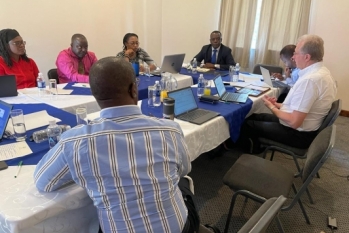News & Events
The Zambezi Watercourse is set to benefit from a global USD350 million fund disbursed through the Climate Investment Funds (CIF) to finance nature-based solutions to climate change threats.
At the 27th Conference of the Parties to the UN Framework Convention on Climate Change (COP27) in Sharm el-Sheik, Egypt, in November 2022, the Zambezi Watercourse region was named one of only five countries or regions to be funded by the CIF’s Nature, People and Climate (NPC) investment platform launched in June 2022.
The CIF NPC pilots and scales transformative nature-based climate solutions in developing countries. The four other states of this first set of countries and regions to benefit from the CIF NPC fund are Egypt, the Dominican Republic, Fiji and Kenya.
Five of the Zambezi’s riparian states – Zambia, Malawi, Mozambique, Namibia and Tanzania ......
The Zambezi Water Commission (ZAMCOM), in collaboration with the Go-Nexus Project, held their first workshop for stakeholders in the Zambezi Watercourse, from 12-13 October 2022, to analyze critical issues in the development and management of the shared water resources.
Delegates drawn from the eight Riparian States attended the one and half day dialogue in Harare, Zimbabwe. ZAMCOM Executive Secretary (ES) Felix Ngamlagosi in his welcome remarks said the aim of the meeting was to introduce the Go-Nexus project to key water, energy, food and ecosystems (WEFE) stakeholders in the watercourse, and to establish a basis for co-operation between the parties.
In pursuit of this goal, the dialogue sought to examine the interconnection or nexus challenges that the project shall tackle using the Go-Nexus methodology.
The Zambezi Watercourse Commission (ZAMCOM) in October held an internal workshop to assess its readiness to access climate finance. The workshop was sponsored by the Climate Resilient Infrastructure Development Facility (CRIDF), a ZAMCOM strategic partner organisation.
In his opening remarks ZAMCOM Executive Secretary (ES) Felix Ngamlagosi described the workshop as an important first step towards identifying and addressing the institution’s limitations in successfully attracting global climate finance to fund programs aimed at mitigating climate change risks in the Zambezi watercourse.
“The global climate finance structure is complex and varied, involving different financial instruments, multitude of actors, and highly competitive. ZAMCOM, like many other organisations and even countries, .........”



